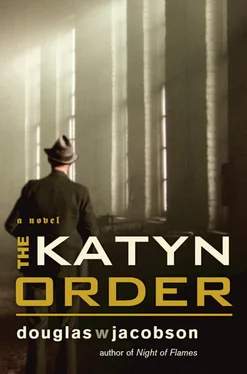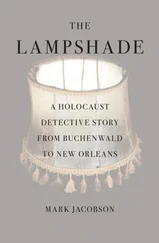Farther on, they passed the Brandenburg Gate. Atop the heavily damaged monument, where a goddess in her chariot had overlooked the city since the beginning of the nineteenth century, a Soviet flag fluttered in the breeze. Smoky, dust-filled air burned Adam’s throat as they turned onto Wilhelmstrasse, the main artery of central Berlin and its administrative center since the days when it was the Kingdom of Prussia. A shiver ran down the back of Adam’s neck as they drove past the bombed-out Reich Chancellery, where a cadre of NKVD riflemen stoically guarded Hitler’s vacated Fuhrerbunker.
Meinerz leaned over. “I was attached to the Sixty-Ninth Infantry Division, First Army Group. We made contact with the Russians on the Elbe, west of Berlin. The higher-ups had decided that the Russians were going to take Berlin, so we stopped and sat there while the Red Army pounded the hell out of the city for over a week with heavy artillery and Katyusha rockets. They had a million troops closing in on Berlin from three directions, probably killed as many of their own men as they did Germans.”
Adam knew about Katyusha rockets, incongruously named after a Russian wartime song about a girl longing for her lost lover. The rocket launchers weren’t very accurate but, when they were massed in large numbers for saturation bombardments, they created a hell of a paralyzing shock on enemy troops and civilian populations.
Adam imagined the scene: So Meinerz had just sat there with the rest of the Americans, watching as the Russians laid waste to Berlin, watching those rockets blast the life out of the city. Wasn’t it the same thing the Russians had done in Warsaw, standing by while the Germans blew it to hell? Did it matter whether it was Germans or Poles, Russians or Americans? Did it make a difference depending on which countries were allies at the moment? He didn’t know. Nobody did.
A moment later they drove past a group of Red Army soldiers smoking cigarettes and jeering at a couple of elderly women hoisting rubble into a horse-drawn cart. Adam instinctively jerked his thumb toward the Russians. “These are the same fucking cowards who sat in their tanks and watched while a quarter of a million Polish civilians were slaughtered in Warsaw and the rest driven out of their homes!” He stopped abruptly, realizing he couldn’t say any more without creating doubts about his cover story. Meinerz was a savvy, no-nonsense officer, and that suspicious look in his eye had returned. But with that spontaneous outburst Adam realized he had just answered his own question. What happened in Warsaw and Berlin were different. They were different because he was in Warsaw when it happened, and Poland was his birth country. It wasn’t a matter of who was right and who was wrong. But it did make a difference. It made a difference to him —because it was personal.
Meinerz raised his eyebrows. “Christ, if you hadn’t told me differently, I’d swear you were right there watching it happen.”
“We got the reports in London,” Adam replied quickly, then changed the subject. “I understand the only German troops left to defend Berlin by the time the Russians got here were old men and the Hitler youth.”
Meinerz looked at him for a moment before responding. “Yeah, and most of them ran away when the Red Army moved in. The Russians charged through the streets tossing grenades into the cellar windows of wrecked buildings. They didn’t care who they killed—women, children, it didn’t matter. Then they’d kick in the doors, drag out any women still alive and rape them.”
Adam took a last glance at the Red Army soldiers, wishing once again for a weapon.
Farther along Wilhelmstrasse, the Russian truck slowed as they approached a massive seven-story structure surprisingly intact in this area of almost complete devastation. “Here we are,” Meinerz said. “It’s the Air Ministry building that Hermann Goering built in honor of his Luftwaffe. I’m told the ceilings of the upper floors were constructed with sixty centimeters of steel-reinforced concrete. That’s why it’s still standing.”
The truck came to an abrupt halt, forcing the corporal to slam on the Jeep’s brakes. He mumbled a curse as the NKVD riflemen jumped off the truck and came to rigid attention. Adam and Meinerz climbed out of the Jeep. Adam stiffened as the thick-necked major from the aerodrome emerged from the cab of the Russian truck. He glared at Adam and Meinerz, then spun on his heel and marched briskly toward the steps of the imposing structure. One of the riflemen motioned for them to follow.
Soviet flags stood on each side of the entrance next to hand-lettered signs in Russian and English, indicating this was the headquarters of the Soviet Military Administration. Inside the building, broad corridors extended in two directions as far as Adam could see. Russian officers scurried past them carrying briefcases and armfuls of documents, the sound of their boots echoing off the hard marble surfaces. Three NKVD officers and a young woman in a Red Army uniform sat behind an enormous reception desk flanked by hard wooden benches.
The thick-necked major stepped up to the desk, spoke briefly to the woman, then marched off without a word. Adam and Meinerz looked at each other and turned to follow, but one of the riflemen blocked their way. He motioned toward the benches instead.
Half an hour passed, then forty-five minutes. Finally, the woman emerged from behind the desk, stepped over and said in English, “Gentlemen, if you please to follow me.”
She led them down the corridor to the left, up two flights of steps and down another corridor. She stopped at a set of double doors. Adam tensed when he saw the brass plate fixed to the wall. He couldn’t read the Cyrillic letters but he knew the name was General Andrei Kovalenko.
“Please to wait here,” the woman said and stepped inside the office. A moment later she reappeared and motioned for them to enter.
The office was about the same size as the parlor of the mansion Adam and Meinerz were staying in and just as lavishly furnished, complete with oriental rugs and soft leather chairs. Enormous, oak-framed windows, two of them still boarded up, covered the wall opposite the door, offering a gut-wrenching view of the ruins of Berlin. On the wall to the left was a fireplace flanked by oak shelves filled with books, photographs and various trophies.
Adam studied the books while the woman laid a file on the general’s desk, spoke a few words to him and left the office. The books were all German—military texts by Clausewitz, Guderian, Rommel, von Kluck, and works of philosophy and science by Goethe, Engels and Einstein. Adam wondered whose office this might have been before the Russians took over. Goering’s perhaps?
The tall, broad-shouldered Red Army general that Adam remembered from that night on the other side of the Vistula River stood behind the desk with his hands clasped behind him. Now, however, instead of the dusty field jacket he’d been wearing the last time, General Kovalenko wore a crisp dress uniform with gold epaulettes and rows of campaign medals. Adam thought he looked older, his close-cropped hair grayer, his face more heavily creased.
Sitting on one of the two settees in front of the general’s desk was the aerodrome major. He did not stand up.
“I am General Andrei Kovalenko,” the general said. His voice was deep and coarse, but his English was as fluent as Adam remembered. He gestured toward the major, who had not looked up or acknowledged their presence. “This is Major Dmitri Tarnov, of the NKVD. I believe you met.”
Meinerz stepped forward and held out his hand to the general. “Colonel Tim Meinerz, American First Army, now assigned to the Judge Advocate General.”
Читать дальше












